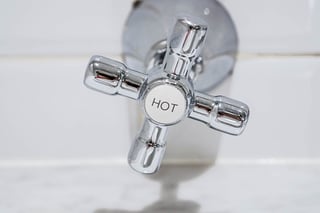Home Plumbing Questions: Is a Tankless Water Heater Right for You?
[fa icon="calendar"] January 18, 2017 / by Home Services Expert
 Like other northern Californians, you've probably caught yourself casting a long, sideways glance – otherwise known as a dirty look – at your water heater.
Like other northern Californians, you've probably caught yourself casting a long, sideways glance – otherwise known as a dirty look – at your water heater.
It's big. It takes up space you probably could use for storage. And it's hardly a thing of beauty – odd-shaped and clunky-looking.
More importantly, it might not be the most economical way for you to heat water for your home. An alternative: a tankless water heater, also known as a demand water heater, because it provides hot water only where it is needed.
What Is a Tankless Water Heater?
Tankless water heaters probably won't engender dirty looks; they are much smaller – about the size of a suitcase – and so are less obtrusive than conventional water heaters. But they also offer a limited flow of hot water per minute and cost more upfront – issues you might be able to reconcile in the long term.
Let a Chico plumber from Experts in Your Home help you decide if a tankless water heater is right for you and your home plumbing.
It's Not Pretty, But it Works
Your water heater is like a reservoir – storing between 20 and 80 gallons of water at a time and delivering it when you turn on a hot water faucet. It releases this hot water from the top of the unit; to replace it, cold water enters the bottom so that the tank always stays full.
The operation sounds logical enough until you consider that water is constantly heated in the tank – even when a hot-water faucet in your home hasn't been turned on. The result is what the U.S. Department of Energy refers to as “standby heat loss” – a wasteful condition that costs you money every month.
You can insulate your water heater to stem some of this loss – or the Experts can do it for you. But a tankless water heater sidesteps this problem even more effectively.
Add up the Savings with a Tankless Water Heater
When you turn on a hot water faucet with a tankless water heater, cold water travels through a pipe and into the unit, where it is heated by coils and delivered right where you need it – right on demand. Without standby heat loss, the monthly energy savings can add up. The department estimates that tankless water heaters:
- Can be between 24 and 34 percent more energy efficient for homes that use 41 gallons or less of hot water a day
- Can be between 8 and 14 percent more energy efficient for homes that use a great deal of hot water, or about 85 gallons or more of hot water a day
- Result in an average annual savings of about $100
- Can achieve even greater savings – up to 50 percent – if one is installed at each hot water outlet in a home
This last scenario also would negate one of the drawbacks of tankless water heaters: the somewhat limited flow rate, which is generally between 2 and 5 gallons a minute. With at least two tankless water heaters in your home, you could avoid straining one unit to the limit when, say, someone is taking a shower while someone else is trying to wash a load of whites in the washing machine.
Let the Experts Help you Crunch the Home Plumbing Numbers
Admittedly, multiple tankless heaters might strain something else: your budget, at least initially. You will recoup your investment, but it will take time to pull even.
As long as you're doing the math, mark the other side of the balance sheet in favor of tankless water heaters. While conventional water heaters cost less up front, they last only between 10 and 15 years.
Tankless water heaters last nearly twice as long, or 20 years or more, so you won't need to replace them nearly as often. Your final decision may well turn on how much hot water your family uses – and at what times you need the water most.
Make an appointment with the licensed Chico plumbers at Experts in Your Home to find out – before you give your clunky water heater one more dirty look.



